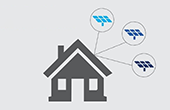Perhaps no one is more familiar with prolonged power outages than Floridians. Increasingly, people throughout the Sunshine State are turning towards energy storage systems as a way to keep their homes and businesses up and running through hurricane season.
The best way to compare your solar options and save money at the same time is by registering on the EnergySage Marketplace. When you compare quotes for solar panels on EnergySage's competitive solar marketplace, you can expect to see prices up to 20% lower than working with a single solar company. Read our updated article on the cost of solar panels to compare solar costs across states and by panel brand.
What storage incentives are available in Florida?
Unfortunately, the State of Florida does not currently offer any energy storage incentives. However, JEA electricity customers can save thousands on a solar battery purchase thanks to the utility’s storage rebate program:
JEA’s battery incentive program
Do you live in Jacksonville? If so, you can receive a check to cover part of your solar battery purchase through JEA’s battery incentive program.
This program offers an upfront rebate of $2,000 to JEA customers–both residential and commercial–to help decrease the cost of installing a solar-plus-storage system. However, in order to participate in the program, your battery must:
- Connect to a renewable energy generation system (like solar)
- Be a new purchase (replacement batteries are ineligible)
- Have at least 6 kilowatt-hours (kWh) of usable capacity
- Have a warranty of at least 10 years or 5,000 cycles
- Be programmable to operate in self-consumption mode
Florida tax benefits for energy storage
Floridians installing a solar-plus-storage system can save thousands on taxes with the federal investment tax credit (ITC).
The federal investment tax credit (ITC)
With the federal investment tax credit (ITC), you can claim up to 30 percent of the cost of your solar battery as a credit towards your federal taxes. For most homeowners, the ITC can help decrease the cost of a battery by an additional $3,000 to $4,000.
Importantly, standalone storage is not currently eligible for this credit – but it will be starting in 2023 thanks to the Inflation Reduction Act! To claim this incentive for the remainder of 2022, you need to charge your battery with an on-site renewable energy source (like rooftop solar). If you have a residential solar panel system and you charge your battery with electricity from the grid, you cannot take advantage of this credit right now.












